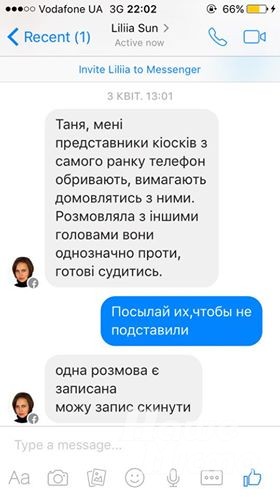Институт «Ткума» и музей «Память еврейского народа и Холокост в Украине» стали важной частью программы для участников проекта «Украина своими глазами», в котором принимают участие гражданские активисты, блогеры и общественники из России, не доверяющие российской пропаганде и желающие составить свое мнение.
Архів категорії: Право
Воєнний стан в Україні: чи варто вводити?
Член екологічної комісії обласної ради Павло Хазан на Oboz. TV про те, чи варто вводити воєнний стан в Україні.
Власники МАФів знищують сквер та погрожують місцевим жителям
Усе місто слідкує за розгортанням боротьби між жителями мікрорайону Тітова-Янгеля та власниками МАФів. Це протистояння стало продовженням конфлікту, за яким ми спостерігали минулого тижня.
Незаконне встановлення МАФів, знищення зелених насаджень, захоплення зон відпочинку, порушення санітарно-гігієнічних норм, правил благоустрою, залякування громадян, посягання на їх конституційні права.
Це не боротьба за виживання малого бізнесу. Це – знущання над здоровим глуздом, прямі погрози свідомим громадянам. Під загрозою екологічна безпека і право на здорове чисте довкілля.
Далі пряма мова ЗМІ, що слідкувало за перебігом подій, nashemisto.dp.ua
…Конфликт жителей микрорайона Титова-Новокрымская-Янгеля с собственниками МАФов, которые всячески пытаются вновь развернуть торговлю на насиженных местах.

Как известно, в этой борьбе уже есть первые жертвы. Активистка Лилия Богачева получала угрозы лично, в соцсетях, по телефону и в результате была госпитализирована в больницу с сильнейшим нервным срывом. Девушка была некоторое время обездвижена, и только с воскресенья начала самостоятельно принимать пищу.
Поскольку врачи ограждают Лилию от любых нервных и психологических нагрузок, мы попросили прокомментировать ситуацию ее коллег, которые знают подробности конфликта.
 Алексей Ангурец, председатель областного экологического совета при Днепропетровской областной государственной администрации:
Алексей Ангурец, председатель областного экологического совета при Днепропетровской областной государственной администрации:
— Ситуация на Новокрымской мне близка, потому что я сам живу в этом районе и как эколог понимаю, какой вред наносят торговые сооружения, с которыми началась борьба. Да, несомненно, есть факты запугивания. К сожалению, активисты в нашей стране с таким сталкиваются не впервые. Угрозы бывают разными. От легких предупреждений и до самых печальных событий. Например, днепропетровский эколог Владимир Гончаренко был убит.
Лично я не получал угроз и запугиваний. Но это, я считаю, лишь благодаря тому, что я имею опыт подобного общения.
Со слов Лилии знаю, что были звонки на ее телефон, часть записей она выложила на своей страничке в Фейсбуке , были непосредственные угрозы. Это очень негативно отразилось на ее здоровье. И здесь нужно обратиться к властям, которые обязаны обеспечить безопасность людей, которые отстаивают свои конституционные права.
Кто ведет эту травлю? Скорее всего, так называемая группа предпринимателей, потерявшая свои киоски на Новокрымской. Я не видел документов, но слышал название «Самозахист підприємців». Они называли себя так на общественных слушаниях.
Власть обязана усадить стороны конфликта за один стол. Должны быть сформулированы и написаны на бумаге предложения предпринимателей и мнение общественности, исходя из законодательства Украины. Киоски незаконны, есть документы о границах сквера Янгеля. Какие здесь могут быть варианты?
Татьяна Лампика,
ОО «Общественное
взаимодействие»
— Наша общественная организация ведет разноплановую деятельность. Сфера, в которой была задействована Лилия Богачева, связана с благоустройством города. Она выкладывала в Интернет факты угроз. К сожалению, мы подключились к этой ситуации довольно поздно. Когда Лиля ехала писать заявление в милицию, ее юрист не довез. Она в очередной раз потеряла сознание. Лилию доставили в больницу, госпитализировали. Она неделю не могла ходить. И только с воскресенья начала пытаться есть.
Естественно, что сейчас никто не признается в том, что угрожал ей. Это дело правоохранителей. Найти этих людей, предъявить им обвинение, провести расследование. Ведь нанесен серьезный урон здоровью человека.
Но когда мы встречались в пятницу (16 апрела- Ред.) на улице Новокрымской на так называемых общественных слушаниях, которые собирал непонятно кто, там основную массу представляли собственники ларьков и их сотрудники. Были также три представителя ОСББ, активисты и несколько местных жителей. Председатели ОСББ высказались категорически против временных сооружений, предприниматели стояли на своем. При чем аргументация была категоричной: «А мы хотим торговать!» Дискуссия была абсолютно неконструктивной.
Основная задача – придерживаться закона. Временные сооружения не должны стоять ни на улице, ни на территории сквера. Компромисса здесь быть не должно, он ведет к коррупции. Государство прописало законы, по которым мы живем, давайте их придерживаться.
В этом конфликте активную позицию занимает «Самохахист підприємців». Ребята, в основном, спортивного вида, ведут себя агрессивно, не хотят ни кого слушать. Я считаю, что организация, которая состоит не из простых людей, общественных деятелей, а из собственников МАФов — это не общественная организация, а ассоциация юридических лиц.
Открытый конфликт у меня был с ними под горисполкомом, когда я пыталась объяснить им, что существует закон, определенные санитарные нормы. Но молодые люди достаточно откровенно хамили, практически лезли в драку, высказывались нецензурно и оскорбляли меня. Я считаю, что это открытый и намеренный конфликт.
Ситуацию, в которую попала Лиля, мы будем решать исключительно в рамках закона, вплоть до суда. Угрозы – это незаконно. Лечение человека, не говоря уже о моральной травме, стоит денег. Виновные, безусловно, должны понести ответственность. И на чиновников, которые это допускают, тоже нужно воздействовать. Никаких «договариваться» не получится, все должно быть в рамках закона.
Ми продовжуємо слідкувати за ситуацією і будемо тримати вас в курсі справ.









